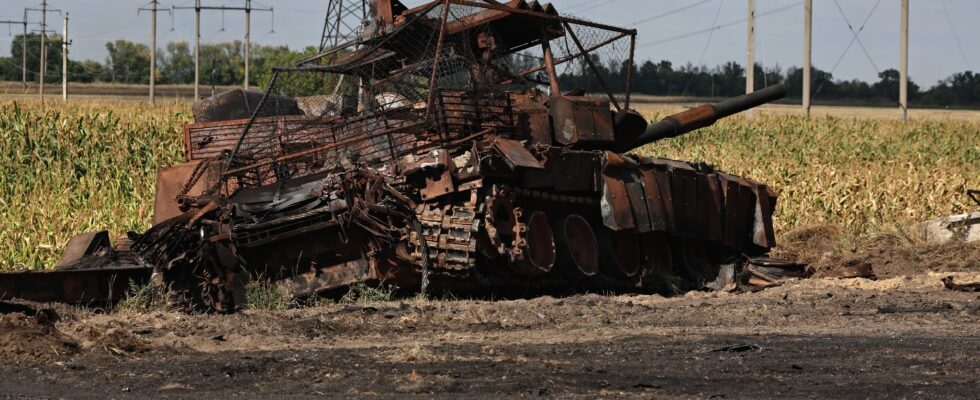Nearly five months after launching their offensive at Kursk in the torpor of August, it was this time in the heart of winter that the Ukrainian forces went on the attack again, on January 5. “Around 9 a.m. Moscow time, the enemy launched a counterattack in order to stop the advance of Russian troops,” the Russian Defense Ministry warned the same day, citing the involvement of two tanks and ‘around ten armored vehicles. If the Ukrainian command did not give details, geolocated images published shortly after the start of the operation suggest that its troops would have attacked three localities northeast of Sudja – a small Russian border town in 5,000 inhabitants in the hands of kyiv since the beginning of August.
A painful reminder for the head of the Kremlin: despite his desire to regain control of this territory which, during the Second World War, had seen the largest tank battle in history take place between German forces and the Red Army, the Ukrainians cling to it firmly. “For what we see today, the idea behind this offensive is to preserve territorial gains in the region,” underlines General Jean-Paul Paloméros, former chief of staff of the army of the “The Ukrainians will try to hold them, so that the Russians don’t take back more than they have taken back until today.”
Massacre among the North Koreans
After launching a lightning offensive on August 6, the Ukrainians quickly took control of approximately 1,300 km2 in this region located in the north of the Ukrainian oblast of Sumy, initially facing a disparate defense composed of some 11,000 soldiers. Russians including many border guards and conscripts. A month after the launch of the operation, at the beginning of September, Moscow put itself in battle order by relying on the deployment of 40,000 additional men to which were then added around 12,000 North Korean soldiers. At the end of several weeks of counter-offensive, this motley aggregate finally regained around half of the lost territories, mainly on the western flank of the zone conquered by kyiv.
“When this offensive was launched last summer, most observers thought it would only last a short while, points out François Heisbourg, special advisor to the Foundation for Strategic Research (FRS) and author ofA world without America (Odile Jacob, 2024). But it ultimately constituted an unexpected success for Ukraine, which not only managed to keep half of its gains, but still today remains capable of carrying out offensives of a limited scale.”
The reconquest of its lost territories was, moreover, costly in men for Moscow. “During the Kursk operation, the enemy has already lost more than 38,000 soldiers” in the region, “including around 15,000 irrecoverable”, affirmed Volodymyr Zelensky on January 5 on the occasion of the five months of his operation. Among them, the death toll among North Korean soldiers is said to be appalling. Of the 12,000 men sent to fight for the Russians, more than 3,800 have already been killed or wounded, the Ukrainian president added the same day. A figure more than three times higher than that of 1,100 mentioned by Seoul ten days earlier.
Pledge for possible negotiations
In fact, their sending to the front line quickly turned into a fiasco. In mid-December, Ukrainian intelligence claimed that eight Chechen soldiers from Kadyrov’s Ahmad battalion had died under the bullets of Kim Jong-un’s men. The reason: the language barrier which complicates coordination between Russian and North Korean units. “North Korean units have almost no combat experience,” observes General Ben Hodges, former commander of the American army in Europe. “Like the Russians, they are used like cannon fodder and have already lost nearly 30% of their workforce.” The intensification of fighting in the area in recent days is expected to further increase the toll. On January 7, the Ukrainian general staff claimed to have repelled 94 Russian assaults in the Kursk region, almost half of the 218 clashes recorded on the same day across the entire front.
While Russian territory had not been invaded by a foreign force since the Second World War, the infiltration of Ukrainian forces in Kursk was a snub for Vladimir Putin. The head of the Kremlin no longer risks setting a timetable for the recovery of his lost territories. “I cannot answer the question of a precise date at the moment,” he said on December 19 during his annual press conference, contenting himself with assuring that his troops “will hunt without a doubt” the forces of kyiv. “The fact is that Russia has so far been unable to absorb this Ukrainian bridgehead on its territory, points out General Ben Hodges. At some point, it will have to redirect more men into this sector of the front if it wants to achieve this.” Enough to pose a dilemma for the Russian general staff, which, since the summer, has chosen to concentrate its efforts on the Donetsk region, in order to progress towards the strategic city of Pokrovsk.
Especially since for Moscow, time is running out. As the inauguration of Donald Trump approaches on January 20, who, during his campaign, made a point of being able to bring Moscow and kyiv together around a table with a view to ending the conflict, the incursion into Kursk offers the Ukrainians a card to play. “From their point of view, it is an important guarantee in the context of a possible negotiation, confirms François Heisbourg, of the FRS. It will always be more comfortable for them to approach any attempt at talks with this territory as a potential currency exchange than without.” Particularly in a context where Moscow does not seem ready to make any concessions regarding its maximalist war goals. On January 6, American Secretary of State Antony Blinken estimated that the position of the Ukrainian army in Kursk will be “important” in the perspective of possible negotiations under the next American administration. Vladimir Putin will still have to want to negotiate.
.
